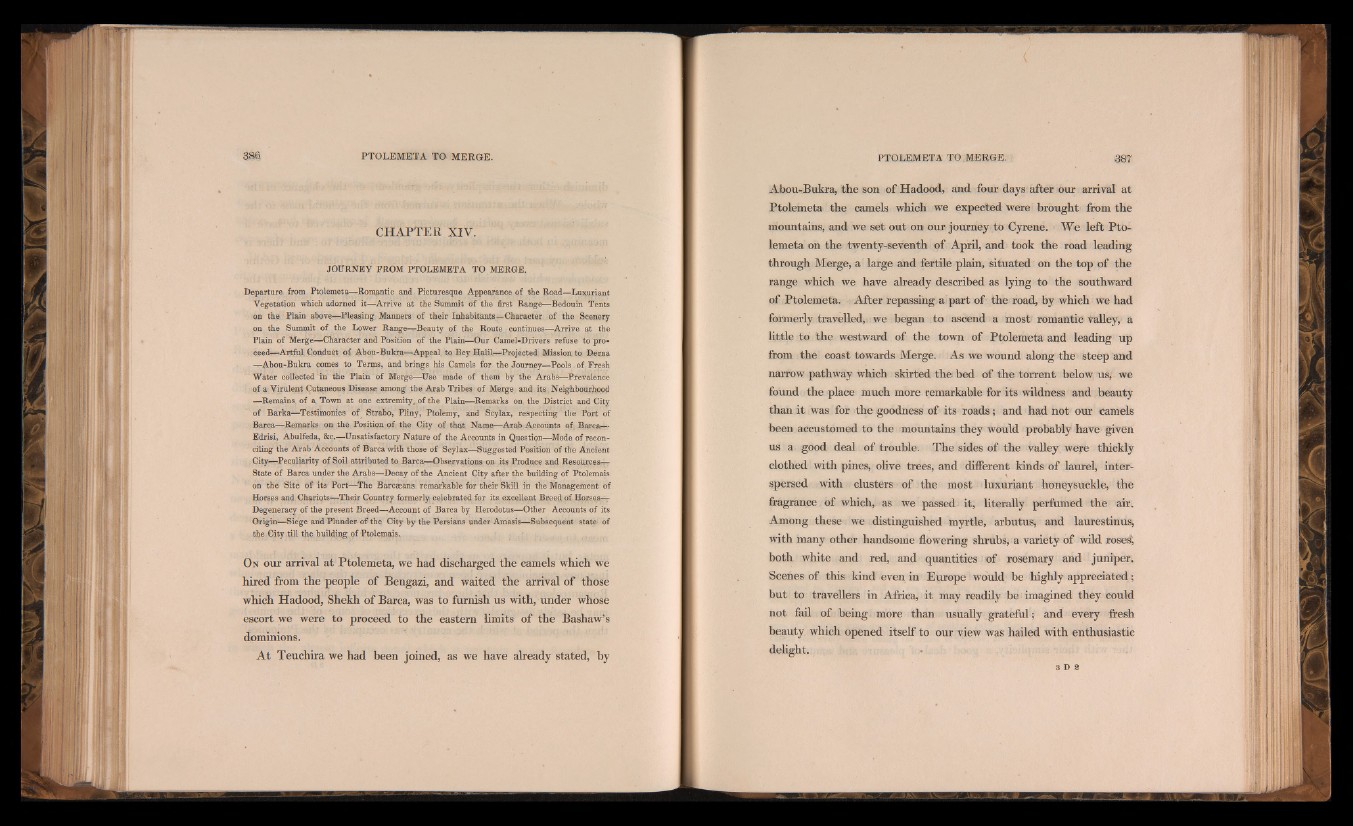
CHAPTER XIV.
JOURNEY FROM PTOLEMETA TO MERGE.
Departure; from Ptolemeta—rRona^ntic and Picturesque Appearance of the Road—Luxuriant
Vegetation which adorned it—Arrive at the Summit of the first Range—Bedouin Tents
on the Plain above-—Pleasing Manners of their Inhabitants—Character , of the Scenery
on the Summit of the Lower Range—Beauty of the Route continues—Arrive at the
Plain of Merged—Character and Position of the Plain—Our Camel-Drivers refuse to proceed—
Artful: Conduct of Abou-Bukra—Appeal to Bey Halil—Projected: Mission to Desna
—Abou-Bukra comes to Terms, and brings his Camels for the Journey—Pools of Fresh
Watér collected in the Plain of Merge—Use made of them by the Arabs—Prevalence
of a Virulent Cutaneous Disease among the Arab Tribes of Merge and its Neighbourhood
—Remains, of a. Town at one extremity, of the Plain—Remarks on. the District and City
of Barka—Testimonies urj Strabo, Pliny, Ptolemy, and Scylax, respecting the Port of
Barca—Remarks on the Position of the City of that Name—Arab Accounts of Barca—-
Edrisi, Abulfeda, &q.—Unsatisfactory Nature of the Accounts in Question—Mode, of reconciling
the Arab Accounts of Barca with those of Scylax—Suggested Position of the Ancient
City—Peculiarity of Soil attributed to Barca—Observations on its Produce and Resoureesrr-
State of Barca under the Arabs—Decay of the Ancient Qity after the building of Ptolemais
on thé Site of its Port—The Barcæans remarkable for their Skill in the Management of
Horses and Charipts—Their Country formerly celebrated, for its- excellent Breedi ofHprses—
Degeneracy of the present Breed—Account of Barca by Herodotus—Other Accounts of its
Origin—Siege and Plunder of the City by the Persians under1 Amasis—Subsequent state of
the City -till the building; of Ptolemais.,
O n our arrival at Ptolemeta, we had discharged the camels which we
hired from the people of Bengazi, and waited the arrival of those
which Hadood, Shekh of Barca, was to furnish us with, under whose
escort we were to proceed to the eastern limits of the Bashaw’s
dominions.
At Teuchira we had been joined, as we have already stated, by
Abou-Bukra, the son of Hadood, and four days after our arrival at
Ptolemeta the camels which we expected were brought from the
mountains, and we set out on our. journey to Cyrene. We left Ptolemeta
on the twenty-seventh of April, and took the road leading
through Merge, a large and fertile plain, situated on the top of the
range which we have already described as lying to the southward
of Ptolemeta. After repassing a part of the road, by which we had
formerly travelled, we began to ascend a most romantic valley, a
little to the westward of the town of Ptolemeta and leading up
from the coast towards Merge. As we wound along the steep and
narrow pathway which skirted the bed of the torrent below us, we
found the place much more remarkable for its wildness and beauty
than it was for the goodness of its roads ; and had not our Camels
been accustomed to the mountains they would probably have given
us a good deal of trouble. The sides of the Valley were thickly
clothed with pines, olive trees, and different kinds of laurel, interspersed
with clusters of the most luxuriant honeysuckle, the
fragrance of which, as we passed it, literally perfumed the air.
Among these we distinguished myrtle, arbutus, and laurestinus,
with many other handsome flowering shrubs, a variety of wild rosei,
both white and red, and quantities of rosemary and juniper.
Scenes of this kind even in Europe would be highly appreciated ;
but to travellers in Africa, it may readily be imagined they could
not fail of being more than usually grateful; and every fresh
beauty which opened itself to our view was hailed with enthusiastic